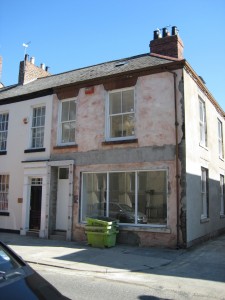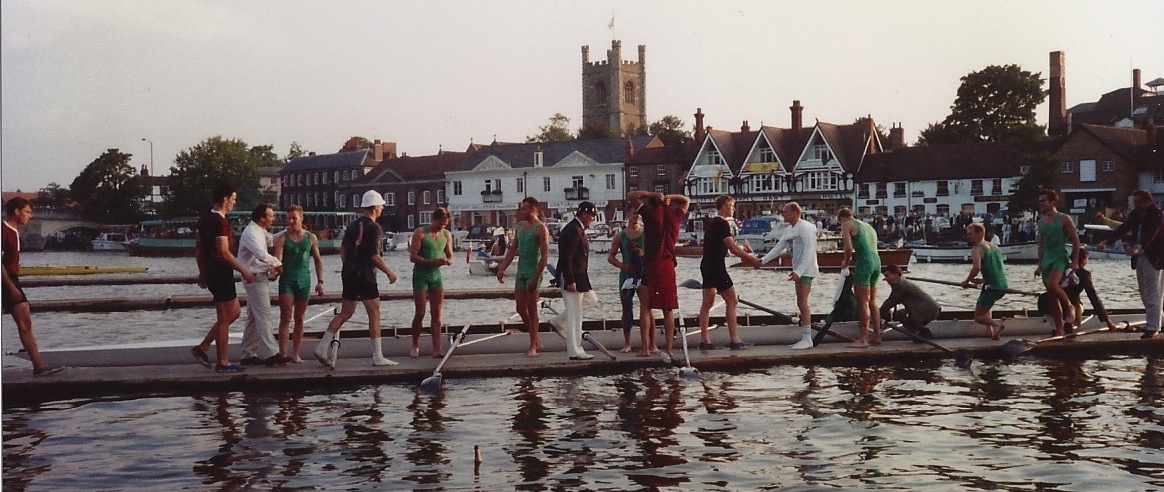
Update: 19 November 2010 – Good to hear that Alcock’s birthplace has now been commemorated with a Blue Plaque. The Sunderland Echo previewed its unveiling in August 2010 and the FA’s World Cup bid team were quick off the mark to remind everyone of Alcock’s role as inventor of international football: FIFA’s decision on which country should host the 2018 tournament was due to be taken on 2 December 2010.
Described by the official historian of the Football Association as ‘the forgotten father of English sport’, Charles William Alcock was a central pillar of London’s sporting establishment in the fourth quarter of the 19th Century. Surprisingly, this pioneering sports administrator and journalist qualifies as a Mackem having been born at 10 Norfolk Street, Sunderland, on 2 December 1842. The son of a ship owner, the Alcock family had moved a few streets to 17 John Street by the time of the 1851 census.
In 1855, Charles followed his elder brother John to Harrow School where both developed a passion for football. On leaving school, together they formed the Forest Club in Epping in 1859.
By 1861, the entire Alcock family had moved south, taking up residence in Essex. Now described in the census as shipbrokers, John and Charles, were near neighbours of the Kings Head Inn in Chingford and lived in a house called ‘Sunnyside’. Whether the house name was chosen as a reminder of the family’s roots in Sunderland’s Sunniside district, or was remarkable coincidence is, for the moment, unknown.
1863 was an eventful year for the two brothers. John attended the inaugural meeting of the Football Association at the Freemasons Tavern in Great Queen Street, London, while Charles took the lead in founding the Wanderers which made its home at the Oval and supplanted Forest as the leading Old Harrovian football club.
Charles was elected to the FA committee in 1866, aged 23. He became secretary in 1870 – a position he held for twenty-five years. Almost immediately, he was involved in organizing the first unofficial international football match between England and a ‘Scotland’ team made up largely of ex-public school Scots living in London. The match, which ended 1-1, was played at the Oval on 5 March 1870.
By 1871, now married with a son and two daughters and declaring himself to be a journalist in the census, Charles had made his home in Rosendale Road, Norwood in a house possibly called ‘Grassendale’.
For the 1871-72 season, and drawing in part on his experience of the ‘Cock House’ inter-house knock-out competition at Harrow, he devised the FA Cup as a competition open to all football clubs. Not content with simply organising the tournament, he also captained the Wanderers team that won the inaugural final – also played at the Oval – on 16 March 1872. (Wanderers went on to win the Cup five times between 1872 and 1878.)
At the same time that he was pioneering the FA Cup and international football, Alcock also became the first paid secretary of Surrey County Cricket Club. Appointed in 1872, he held this post for the rest of his life.
Known to have played rugby for Blackheath – then one of the leading proponents of alternative form of football – with his influence at Surrey, he may well have been involved in the staging of the second rugby international in history: England’s first ever home match was played at the Oval on 5 February 1872.
Back on the football field, Alcock refereed the first official football international – a nil-nil draw between Scotland and England played on 30 November 1872 at the West of Scotland Cricket Club near Glasgow. He also fostered relations with the longer-established Sheffield Football Association, paving the way for the eventual adoption of a common rulebook.
As well as becoming the first president of the Referees Association, Alcock also managed to find the time to serve as president of the Surrey FA, vice-president of the London FA, chairman of the Richmond Athletic Association and vice-president of Royal Mid-Surrey Golf Club.
At Surrey, Alcock assumed responsibility for arranging the first cricket test in England: the England verses Australia match played at the Oval in 1880. Two years later, the Australian demolition of England that gave birth to the Ashes legend also took place on Alcock’s watch.
Alcock was living at 36 Somerleyton Road, Brixton when, in 1881, he was granted a testimonial by the FA Committee ‘in consideration of his having been the founder of the Association game’.
As football grew in popularity, tensions arose between the ex-public school amateurs who dominated the Football Association and clubs mainly from the Midlands and the North who were calling for a more professional approach to the organisation of the game. With his cricketing experience of managing relations between ‘gentlemen’ and ‘players’, Alcock helped to prevent football splitting in the way rugby eventually divided into union and league. However, the 2005 Burns report on the governance of the FA confirms that some of these tensions continued into the 21st century.
By 1891, Alcock, his wife, four daughters and three domestic servants had moved to Heathlands in Kew Road, Richmond. (His son had died as an infant.)
Thanks to Alcock, most of the big FA fixtures came to the Oval up to 1895. Improvements funded by these revenues helped secure the ground’s status as a test venue. Surrey were also successful on the cricket field under Alcock’s stewardship, winning eight county championships between 1887 and 1895.
In addition to his multiple roles in sports administration, he was also a prolific and ground-breaking sports journalist and publisher. In his twenties, he wrote for The Field and The Sportsman before founding specialist magazines such as the Football Annual, Football magazine and Cricket. Alcock’s books included Football: the Association Game (1890) and Surrey Cricket: its History and Associations (1902).
Alcock died on 26 February 1907 at his home at 7 Arundel Road, Brighton. He is buried alongside his son in Norwood Cemetery, a short distance from the Rosendale Road home he occupied in the early 1870s.



